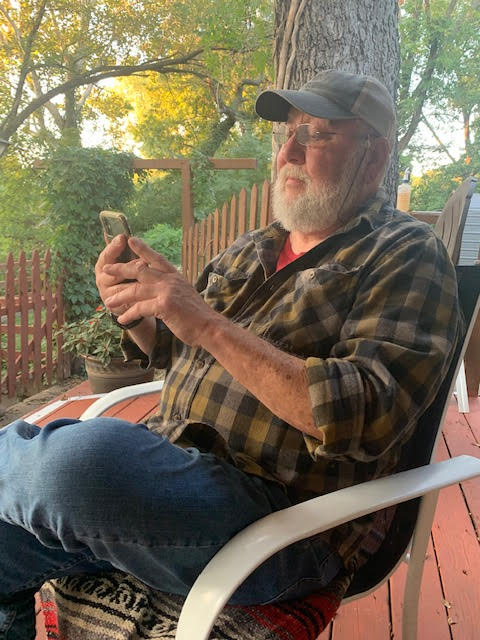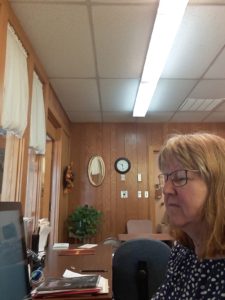After more than a decade on Facebook, Flossie Alexander can speak with experience about the good and bad aspects of social media.
“In the beginning, I was drawn to Facebook as a means to promote my business as a life fitness coach,” Alexander, who joined in 2009, said. “I soon discovered that I enjoyed getting to know people from all over the United States. In the early days, Facebook was less political and more focused on establishing connections. I was amazed at how willing people were to share details of their lives with people they would likely never meet in person. Maybe knowing they would never meet in person made it easier to share. In the beginning, I would spend three or four hours a day on Facebook. Today, I would say I spend only three to five hours per week on it.”
Alexander, who has almost 5,000 Facebook friends, also uses Twitter, Instagram and Snapchat from the time to time, mainly to share things with her daughters.
Although widely regarded as a tool for youth, many older adults have discovered that social media provides a quick, easy and free way to keep in touch with the world. Three-quarters of adults aged 50-64 use social media on a regular basis, while about 45 percent of those 65 and older do so, according to a 2019 report from the Pew Research Center. Facebook is the most popular platform, followed by Instagram and LinkedIn. Older Americans most often sign on to social networks on smartphones (55 percent), followed by computers (47 percent) and tablets (41 percent).
By most accounts, the COVID-19 pandemic sent even more people onto social media. For instance, when the Covid pandemic forced her west Wichita assisted living residence into lockdown, 90-year-old Janice McVicar relied on social media to maintain contact with her extended family and friends. She enjoys looking at family pictures and hearing about important events in their lives.
As popular as it has become, even those who use social media on a daily basis point to some problems with it. “I would say the pitfalls of social media are that while it increases communication with strangers or casual friends, it can get in the way of communication and intimacy with the people who are the closest to you,” Alexander said. “Who has not been in a restaurant and noticed a family sitting together not saying a word to each other because everyone’s face is buried in their phones? On the plus side, it is a great way to find and reconnect with friends from the past.”
Alexander’s husband, David, is on Facebook and YouTube (considered a form of social media because people can post comments on it) although he was slow to engage at first.
“I simply wasn’t convinced that there was anything so interesting about my life that people would want to know about it,” he said. “Over the last five years I have become fairly active on Facebook. It has been a great way to stay connected with former coworkers and friends I don’t get to see on a regular basis. It is also a great way to send funny and interesting things to my children through the Facebook Messenger feature. Like it or not, I have had to accept that social media is the way my children’s generation likes to communicate.
“From a work perspective, I have come to realize that it is a great way to connect with the community,” he added. “Nearly every week I post information on what is happening at work, such as events we are hosting or stories of people doing great work.
When their baby granddaughter contracted cancer, both Alexanders turned to Facebook to keep concerned family and friends informed of her progress. Fortunately, the little girl is now getting along fine.
“The down side to social media is that now reflects just how politically divided and sensitive our country currently is,” David Alexander said. “Social media has emboldened some people to be more disrespectful than they would be in person. Social media that was designed to bring people together is now used to separate people.”
With a laugh, Alexander admits he “used to complain about how much time my wife spent on social media and now I spend way more time on social media than she does.”
“Watching YouTube videos has replaced watching a lot of TV for me. I especially like to watch historic videos. I also have a couple of podcasts that I enjoy listening to. Despite my use of social media, if I could snap my fingers and go back in time to when we didn’t have it, I would do it. It is a strange paradox that something designed to increase communication has increased isolation for many and had a detrimental effect on their mental health.”
Nevertheless, it’s a trend that shows no sign of slowing down.
“I initially joined Facebook because I found out there was a group created for my high school friends and classmates,” Janene Schroeder, a substitute teacher from Sedgwick, said. “They were posting many old pictures and comments from people I grew up with. So it became a connection platform to link up with this group. This interest still holds true for me today after nine years of being a member.”
Rita Kirkpatrick, a church secretary at First United Methodist Church of Newton, uses it for a variety of reasons. “I like to keep track of some of my casual friends,” she explained. “I have enjoyed getting to know two siblings of my classmates. I love to hear when someone’s child wins the spelling bee. Social media helps me keep track of dance events in my area and food events and fundraisers. I like to post about my trips after I get back. Facebook groups have helped me organize family reunions and gatherings of Wednesday women.”
Betty Fry, who is in her 90s, believes Facebook is popular partly because “everyone is so busy anymore, so this is easier for everyone. I also belong to several quilt groups and enjoy following them, and of course book reviews and discussions. Oh yes, and new recipes.”
Rod Milne, a retired Wichita school administrator, uses social media but said it’s not a big part of his life.
“Except for a few laughs from memes, I don’t get much benefit from social media,” Milne said. “I am only on Facebook, and I have no desire to add more.
“I don’t remember how I decided to join Facebook – probably when the grandkids were little, and Facebook was a good way to keep track of what they were doing,” he added. “Today, it is so full of politics and ads that I only glance at recent posts four or five times a day. Most of my phone time is spent googling stuff I want to know and two games of solitaire before I turn off the lights.”









